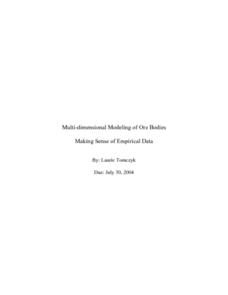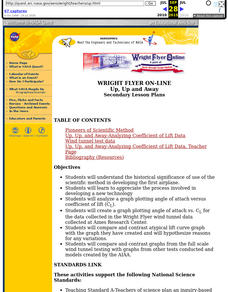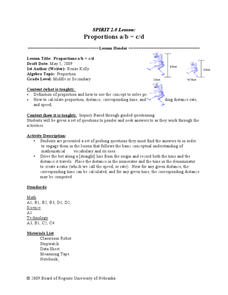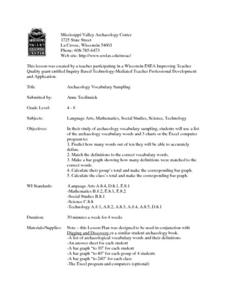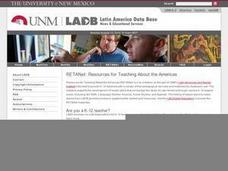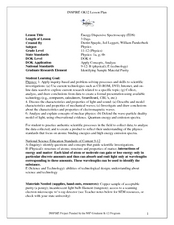Curated OER
A Frog's Life Story
Students investigate the lives of frogs by completing several worksheets. In this biology lesson, students discover the life cycle of a frog from tadpole to death. Students complete frog life cycle puzzle as well as create a life cycle...
Curated OER
Preserve is the Word
Students investigate a list of archaeological ethical questions. They select a question/issue and design a 3-minute (maximum) PSA to persuade the public to agree with their idea. They conduct research or interviews with experts to be...
Curated OER
Multi-dimensional Modeling of Ore Bodies Making Sense of Empirical Data
Math scholars identify four different rock types in that strata and use this identification and data to construct a two dimensional geologic cross-section. They use data tables to construct a three-dimensional geologic cross-section.
Curated OER
Exploring the Celestial Neighborhood
Ninth graders study the origin and organization of the solar system. They investigate the Earth's place in the system and how planetary motions explain natural phenomena observable from Earth.
Curated OER
Untitled Document Aerospace Team Online:
Students explain the historical significance of use of the scientific method in developing the first airplane and appreciate the process involved in developing a new technology.
Curated OER
Boyle's Law
Students experiment on Boyle's law using balloons and other common materials. In this chemistry instructional activity, students explain the relationship between pressure and volume. They solve problems relating to Boyle's Law.
Curated OER
Proportions a/b=c/d
Students calculate distance and proportion of objects. For this algebra lesson, students define proportion and how it is used in math. They solve the problem through guided instruction.
Curated OER
An Encyclo-ME-dia for Every Child
Students create a digital scrapbook that shows information-text and pictures that are specific to each child. They make charts and graphs. They use digital cameras, scanners, software, to write captions, stories, poems, letters, and...
Curated OER
How Can We Locate Specific Places On Earth?
Second graders discover how to use longitude and latitude to locate specific sites on Earth. They compare old and new ways of locating specific places, and discover how latitude and longitude coordinates are used to locate places on Earth.
Curated OER
Archaeology Vocabulary Sampling
Students predict how many words out of ten they accurately define. They match the definitions to the correct vocabulary words and make a bar graph showing how many definitions were matched to the correct words. The write their group...
Curated OER
Electric Field Mapping in 3D
Students create a 3D vector field map of an electric field. In this physics lesson, students measure the voltage inside an aquarium with water. They present their findings and map to class..
Curated OER
Principles of Flight: Where are We?
Young scholars explore the concept of topographical maps. In this topographical map lesson, students discuss how airplanes know where to fly. Young scholars use topographical maps to simulate a field trip on the computer.
Benjamin Franklin Tercentenary
Guess What Benjamin Franklin Did!
Young scholars research Ben Franklin's inventions. In this invention lesson, students see the relationship between a need and an invention. Young scholars will engage in a class discussion, read a handout, and play a match the invention...
Curated OER
Shadows of North Carolina's Past
Students construct a timeline of four major culture periods in Native American history from studying archaeological evidence cards.
Curated OER
Thanks Be To You
Students research U.S. history by completing a worksheet activity in class. In this historical figure lesson, students identify the contributions and risks taken by the former African-American leader Martin Luther King Jr. Students read...
Curated OER
Chemical Bonding
Eighth graders identify the three main types of chemical bonds. In this chemistry instructional activity, 8th graders draw Lewis dot diagrams of elements and determine the bond formed. They create a model water molecule.
Curated OER
Code Makers - Electron Configuration, Aufbau Principle
Learners write the electron configuration of elements using the Aufbau principle. In this chemistry lesson, students build their own key that demonstrates the principle.
Curated OER
Introduction to Ecology
Eighth graders identify the living and nonliving components of an ecosystem. In this ecology lesson, 8th graders explain the role each organism plays. They participate in class discussion and answer a quiz at the end of the lesson.
Curated OER
Investigation of Timbre
Students design an experiment to analyze the timbre of different instruments. In this physics lesson, students analyze the missing quality in sound. They discuss their results in class.
Curated OER
Electronic Journals about Latin American Folktales
Students exchange folktales with a key-pal using dialog journal writing. They write out a folktale from their own cultural background and exchange it with students of another. They record their impressions of each other's folktales.
Curated OER
Energy Dispersive Spectroscopy
Students calculate the values of electron binding energies. In this physics instructional activity, students solve for different wavelength characteristics of X-rays. They present their findings to the class.
Curated OER
Automated Vehicle Programming Design
Students design a program to make an automated vehicle perform a specific task. In this robotics lesson, students play the role of scientists competing to win a factory's contract. They present their algorithm to class.
Curated OER
2D Kinematics w/ String Racers
Students calculate the speed of string racers. In this physics lesson plan, students measure the time in several trials and get the average. They graph their results using a spreadsheet.
Curated OER
Numerical Determination of Drag Coefficients
Students create a video of an object falling with a drag. In this physics instructional activity, students calculate drag coefficient using data from Logger Pro. They calculate velocity and acceleration of the object.




